Bruno Bernard (1912–1987) fled from Nazi Germany to the USA in the 1930s. As Bernard of Hollywood, he became one of the most popular glamour photographers of Tinseltown. In 1961 he returned to Germany, where he photographed many European starlets and also worked as a set photographer.
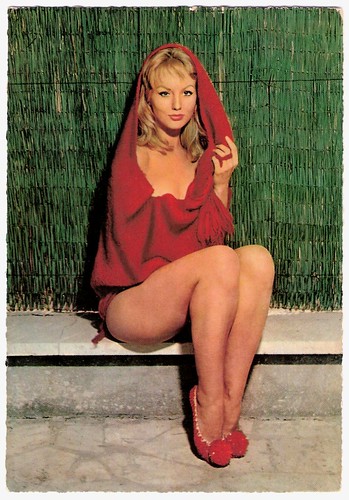
Mylène Demongeot. German postcard by Krüger, no. 902/66. Photo: Bernard of Hollywood.

Jayne Mansfield. German postcard by Krüger, no. 902/67. Sent by mail in France in 1966. Photo: Bernard of Hollywood.
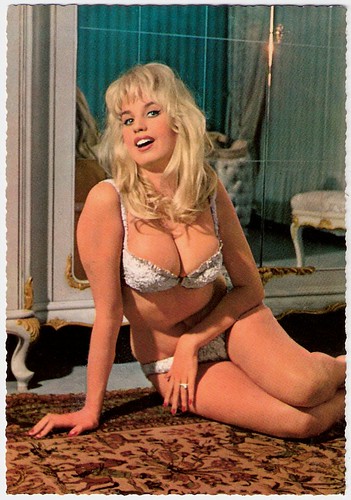
Barbara Valentin. German postcard by Krüger, no. 902/192. Photo: Bernard of Hollywood.
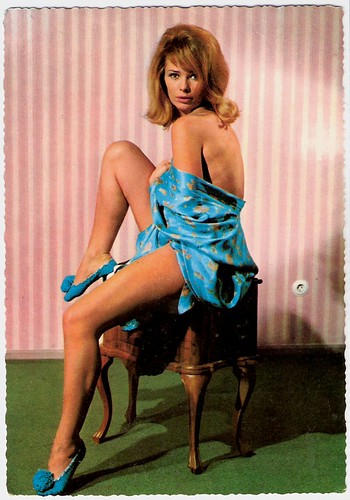
Vivi Bach. German postcard by Krüger, no. 902/277. Photo: Bernard of Hollywood.

Sophie Hardy. German postcard by Kruger, no. 902/291. Photo: Bernard of Hollywood.

Margaret Rose Keil. German postcard by Krüger, no. 900/288. Photo: Bernard of Hollywood.
Bruno Bernard was born Bruno Bernard Sommerfeld (or Sommer) in Berlin, Germany in 1912. His Jewish parents were poor. He and his four siblings were on welfare by the time he was 8 years old and were placed in orphanages.
At age 11, his parents gave him his first camera, a Rolleiflex, in 1923. It led to a lifelong interest in photography. As a young man, he worked as a photographer and reporter and earned a Ph.D. in criminal psychology at the Kiel University. He was in the two percent of Jews to gain a doctorate in 1934.
His activism in a Jewish youth organization landed him on the Gestapo’s blacklist and caused him to emigrate to the United States in 1937. He claimed to the German authorities that he was leaving the country to continue his graduate studies.
He was 26 and attended the University of California, Berkeley, where he planned to continue his education but soon became interested in the arts. He settled in Los Angeles and set up a darkroom in the basement of his apartment.
In 1940, he became a directorial apprentice at the Reinhardt School of the Theatre, opened by Max Reinhardt on Sunset Boulevard in Los Angeles. Unable to get a job as a director, however, Bruno returned to his interest in photography. He started out taking photos of the wives and children of the directors and producers he had come to know through his apprenticeship.
As he began making money, he opened a proper studio at Sunset Boulevard in 1940. Agent Paul Kohner, who helped many Europeans flee after the rise of Adolph Hitler and re-establish themselves in Hollywood, took notice of Bernard’s work. Kohner sent him clients, and thus brought him to the attention of the film industry. 'Bernard of Hollywood' was to reign at this studio for 25 years. It became a landmark of Hollywood.
Bruno developed a unique portrait style that he called the "posed candid"; a style that evolved into what is now known as 'pin-up' photography. Bernard preferred a moderate use of artificial light. He preferred natural light like the sun at the beach and sometimes added a flash to his light concept.
Soon he was called 'The King of Glamour Photography' and 'The Vargas of Pinup Photography', after his mentor, pin-up painter Alberto Vargas. Over the next two years, Bernard opened studios at Laguna Beach, at Las Vegas’s Riviera Hotel, and at the Palm Springs Racquet Club, then the favourite retreat for Hollywood’s top stars.

Monique Van Vooren. French postcard by De Marchi Frères, Marseille. Photo: Bernard of Hollywood.

Marilyn Monroe. American postcard by The American Postcard Company, no. 282, 1981. Photo: Bruno Bernard (Bernard of Hollywood).
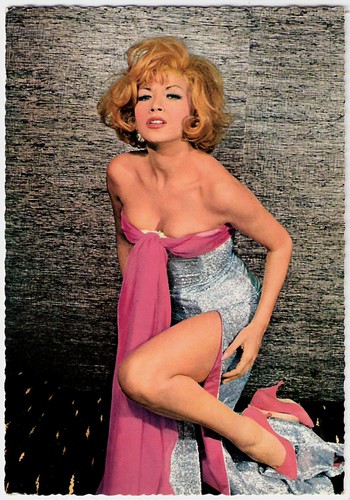
Rita Cadillac. German postcard by Krüger, no. 902/297. Photo: Bernard of Hollywood.

Heidi Brühl. German postcard by Krüger, no. 902/321. Postcard: Bernard of Hollywood.
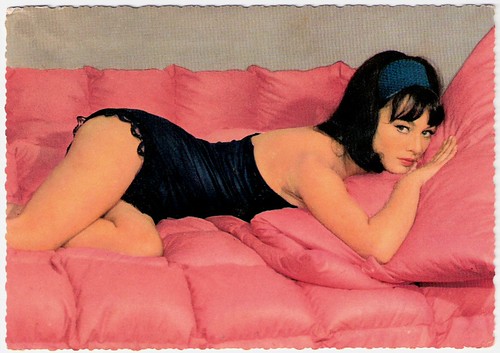
Helga Sommerfeld. German postcard by Krüger, no. 902/324. Photo: Bernard of Hollywood.

Marisa Mell. German postcard by Krüger, no. 902/349. Photo: Bernard of Hollywood.
Bernard of Hollywood photographed most of the big stars of Hollywood of the 1940s and 1950s: Marlene Dietrich, Clark Gable, Bette Davis, John Wayne, and of course Marilyn Monroe.
Bruno Bernard is credited with first photographing Marilyn Monroe at his studio in 1946. She was still known then as Norma Jean Dougherty. In 1947, Bernard introduced Monroe to agent Johnny Hyde, vice president of the William Morris Agency.
Hyde revamped Norma Jean completely from the loveable, carefree All-American Girl to the breathtakingly beautiful Hollywood blonde. A cosmetic surgeon in the Springs restyled her nose and straightened the facial tissues under her skin. Hyde got her seven-year contract with 20th Century-Fox. There, Bernard took the well-known photographs of Monroe in the red dress she wore for Niagara (Henry Hathaway, 1953).
One of Bernard's most famous photos is 'Marilyn in White', shot in New York in September 1954. Monroe is holding her white pleated skirt down from a blast of steam from a New York sidewalk grating in The Seven Year Itch (Billy Wilder, 1955). This photograph was selected as the 'Symbol of the Century' by the Museum of Modern Art in New York.
Bernard's artistic muse, however, was the late, legendary striptease artist Lili St. Cyr, a spectacularly stunning beauty with wit, elegance, and a sense of humor. Bernard of Hollywood's pin-up work ranges from strippers, Vegas showgirls; unknown, poignantly unnamed models; to all the starlets of the 1950s and 1960s. Bernard's daughter Susan Bernard has made the case that the pinup style popularised by Bernard and Alberto Vargas was "celebrating and empowering women rather than exploiting them".
Kevin Thomas in the Los Angeles Times: "No less than Gen. Dwight D. Eisenhower praised Bernard’s pinups, and when--incredibly--Bernard had to fight an obscenity charge all the way to the U.S. Supreme Court in the early 1950s, he submitted in his defense a letter from the Secretary of Defense thanking him for the morale-building effect of his pinups."

German postcard by Kruger. Photo: Bruno Bernard/CCC Produktion. Pierre Brice as Winnetou Old Shatterhand (Hugo Fregonese, 1964).

German postcard by Kruger. Photo: Bernard of Hollywood (Bruno Bernard) / CCC-Produktion. Lex Barker as Old Shatterhand in Old Shatterhand (Hugo Fregonese, 1964).

German postcard by Krüger. Photo: Bernard of Hollywood / CCC Produktion. Pierre Brice in Old Shattterhand (1964). Sent by mail in Luxemburg in 1966.

German postcard by Krüger, no. 902/302. Photo: Bernard of Hollywood / CCC-Zugsmith Co-produktion. Letícia Román in Fanny Hill (Russ Meyer, 1964).

German postcard by Krüger, no. 902/303. Photo: Bernard of Hollywood / CCC-Zugsmith Co-produktion. Letícia Román and Ulli Lommel in Fanny Hill (Russ Meyer, 1964).

German postcard by Krüger, no. 902/358. Photo: Bernard of Hollywood / CCC-Zugsmith Co-produktion. Renate Hütte and Britt Lindberg in Fanny Hill (1964).
In 1961 Bruno Bernard sold his studios and started a new career as a foreign correspondent and photojournalist in Europe. For the German magazine Der Spiegel, he photographed the Eichmann Trial in Israel.
The German postcard publisher Krüger commissioned him to photograph European starlets during the early 1960s. Among them were German film stars as Heidi Brühl, Marisa Mell, and voluptuous Barbara Valentin, a.k.a. the German Jayne Mansfield.
Bernard of Hollywood also photographed the original, when Jayne Mansfield was working in Europe after her Hollywood career had dried up.
Bruno Bernard also worked as a still photographer for films including the erotic film Fanny Hill (Russ Meyer, 1964) and the Eurowestern Old Shatterhand (Hugo Fregonese, 1964).
Bernard returned to the USA, and in the 1980s he was living in Palm Springs and writing his memoirs. In 1984, Bernard became the first still photographer to be honored by the Academy of Motion Picture Arts and Sciences in Los Angeles with a 50-year retrospective of his work. The exhibition showed 130 of his portraits and other pictures.
The celebration was to mark Bernard’s 50th year as a photographer. His 'Marilyn in White' was also chosen by the International Center of Photography as one of the '20 Unforgettable Photographs'.
In 1987, Bruno Bernard died of cancer in Los Angeles at the age of 75. He had just compiled the book 'Requiem for Marilyn'. His daughter Sue Bernard (1948–2019) was the founder and president of Bernard of Hollywood Publishing and wrote several books, among them 'Marilyn: Intimate Exposures' and 'Bernard of Hollywood’s Ultimate Pin-Up Book'. She preserved exhibited and published her father's legacy, introducing his photos to a new generation.
Kevin Thomas in the Los Angeles Times: "There is in Bernard’s pinups an exuberant sexuality that is both innocent and mischievous, seductive yet sweet. Surely, it was the rapport that Bernard had with movie stars and models alike that yielded these wonderful combinations".

Jayne Mansfield. German postcard by Krüger, no. 900/78. Photo: Bernard of Hollywood.

Jayne Mansfield. German postcard by Krüger, no. 900/78. Photo: Bernard of Hollywood.

Jayne Mansfield. German postcard by Krüger, no. 900/78. Photo: Bernard of Hollywood.
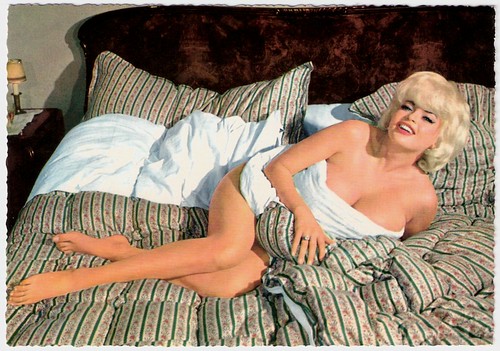
Jayne Mansfield. German postcard by Krüger, no. 900/78. Photo: Bernard of Hollywood.

Jayne Mansfield. German postcard by Krüger, no. 900/78. Photo: Bernard of Hollywood.

Jayne Mansfield. German postcard by Krüger, no. 900/78. Photo: Bernard of Hollywood.
Sources: Kevin Thomas (Los Angeles Times), Susan Bernard (Marilyn Intimate Exposures), Adrienne Miller (Esquire - offline), Bernard of Hollywood.com, Find A Grave, Wikipedia, and IMDb.

Mylène Demongeot. German postcard by Krüger, no. 902/66. Photo: Bernard of Hollywood.

Jayne Mansfield. German postcard by Krüger, no. 902/67. Sent by mail in France in 1966. Photo: Bernard of Hollywood.

Barbara Valentin. German postcard by Krüger, no. 902/192. Photo: Bernard of Hollywood.

Vivi Bach. German postcard by Krüger, no. 902/277. Photo: Bernard of Hollywood.

Sophie Hardy. German postcard by Kruger, no. 902/291. Photo: Bernard of Hollywood.

Margaret Rose Keil. German postcard by Krüger, no. 900/288. Photo: Bernard of Hollywood.
The Vargas of Photography
Bruno Bernard was born Bruno Bernard Sommerfeld (or Sommer) in Berlin, Germany in 1912. His Jewish parents were poor. He and his four siblings were on welfare by the time he was 8 years old and were placed in orphanages.
At age 11, his parents gave him his first camera, a Rolleiflex, in 1923. It led to a lifelong interest in photography. As a young man, he worked as a photographer and reporter and earned a Ph.D. in criminal psychology at the Kiel University. He was in the two percent of Jews to gain a doctorate in 1934.
His activism in a Jewish youth organization landed him on the Gestapo’s blacklist and caused him to emigrate to the United States in 1937. He claimed to the German authorities that he was leaving the country to continue his graduate studies.
He was 26 and attended the University of California, Berkeley, where he planned to continue his education but soon became interested in the arts. He settled in Los Angeles and set up a darkroom in the basement of his apartment.
In 1940, he became a directorial apprentice at the Reinhardt School of the Theatre, opened by Max Reinhardt on Sunset Boulevard in Los Angeles. Unable to get a job as a director, however, Bruno returned to his interest in photography. He started out taking photos of the wives and children of the directors and producers he had come to know through his apprenticeship.
As he began making money, he opened a proper studio at Sunset Boulevard in 1940. Agent Paul Kohner, who helped many Europeans flee after the rise of Adolph Hitler and re-establish themselves in Hollywood, took notice of Bernard’s work. Kohner sent him clients, and thus brought him to the attention of the film industry. 'Bernard of Hollywood' was to reign at this studio for 25 years. It became a landmark of Hollywood.
Bruno developed a unique portrait style that he called the "posed candid"; a style that evolved into what is now known as 'pin-up' photography. Bernard preferred a moderate use of artificial light. He preferred natural light like the sun at the beach and sometimes added a flash to his light concept.
Soon he was called 'The King of Glamour Photography' and 'The Vargas of Pinup Photography', after his mentor, pin-up painter Alberto Vargas. Over the next two years, Bernard opened studios at Laguna Beach, at Las Vegas’s Riviera Hotel, and at the Palm Springs Racquet Club, then the favourite retreat for Hollywood’s top stars.

Monique Van Vooren. French postcard by De Marchi Frères, Marseille. Photo: Bernard of Hollywood.

Marilyn Monroe. American postcard by The American Postcard Company, no. 282, 1981. Photo: Bruno Bernard (Bernard of Hollywood).

Rita Cadillac. German postcard by Krüger, no. 902/297. Photo: Bernard of Hollywood.

Heidi Brühl. German postcard by Krüger, no. 902/321. Postcard: Bernard of Hollywood.

Helga Sommerfeld. German postcard by Krüger, no. 902/324. Photo: Bernard of Hollywood.

Marisa Mell. German postcard by Krüger, no. 902/349. Photo: Bernard of Hollywood.
Strippers, Showgirls, Starlets
Bernard of Hollywood photographed most of the big stars of Hollywood of the 1940s and 1950s: Marlene Dietrich, Clark Gable, Bette Davis, John Wayne, and of course Marilyn Monroe.
Bruno Bernard is credited with first photographing Marilyn Monroe at his studio in 1946. She was still known then as Norma Jean Dougherty. In 1947, Bernard introduced Monroe to agent Johnny Hyde, vice president of the William Morris Agency.
Hyde revamped Norma Jean completely from the loveable, carefree All-American Girl to the breathtakingly beautiful Hollywood blonde. A cosmetic surgeon in the Springs restyled her nose and straightened the facial tissues under her skin. Hyde got her seven-year contract with 20th Century-Fox. There, Bernard took the well-known photographs of Monroe in the red dress she wore for Niagara (Henry Hathaway, 1953).
One of Bernard's most famous photos is 'Marilyn in White', shot in New York in September 1954. Monroe is holding her white pleated skirt down from a blast of steam from a New York sidewalk grating in The Seven Year Itch (Billy Wilder, 1955). This photograph was selected as the 'Symbol of the Century' by the Museum of Modern Art in New York.
Bernard's artistic muse, however, was the late, legendary striptease artist Lili St. Cyr, a spectacularly stunning beauty with wit, elegance, and a sense of humor. Bernard of Hollywood's pin-up work ranges from strippers, Vegas showgirls; unknown, poignantly unnamed models; to all the starlets of the 1950s and 1960s. Bernard's daughter Susan Bernard has made the case that the pinup style popularised by Bernard and Alberto Vargas was "celebrating and empowering women rather than exploiting them".
Kevin Thomas in the Los Angeles Times: "No less than Gen. Dwight D. Eisenhower praised Bernard’s pinups, and when--incredibly--Bernard had to fight an obscenity charge all the way to the U.S. Supreme Court in the early 1950s, he submitted in his defense a letter from the Secretary of Defense thanking him for the morale-building effect of his pinups."

German postcard by Kruger. Photo: Bruno Bernard/CCC Produktion. Pierre Brice as Winnetou Old Shatterhand (Hugo Fregonese, 1964).

German postcard by Kruger. Photo: Bernard of Hollywood (Bruno Bernard) / CCC-Produktion. Lex Barker as Old Shatterhand in Old Shatterhand (Hugo Fregonese, 1964).

German postcard by Krüger. Photo: Bernard of Hollywood / CCC Produktion. Pierre Brice in Old Shattterhand (1964). Sent by mail in Luxemburg in 1966.

German postcard by Krüger, no. 902/302. Photo: Bernard of Hollywood / CCC-Zugsmith Co-produktion. Letícia Román in Fanny Hill (Russ Meyer, 1964).

German postcard by Krüger, no. 902/303. Photo: Bernard of Hollywood / CCC-Zugsmith Co-produktion. Letícia Román and Ulli Lommel in Fanny Hill (Russ Meyer, 1964).

German postcard by Krüger, no. 902/358. Photo: Bernard of Hollywood / CCC-Zugsmith Co-produktion. Renate Hütte and Britt Lindberg in Fanny Hill (1964).
Legends
In 1961 Bruno Bernard sold his studios and started a new career as a foreign correspondent and photojournalist in Europe. For the German magazine Der Spiegel, he photographed the Eichmann Trial in Israel.
The German postcard publisher Krüger commissioned him to photograph European starlets during the early 1960s. Among them were German film stars as Heidi Brühl, Marisa Mell, and voluptuous Barbara Valentin, a.k.a. the German Jayne Mansfield.
Bernard of Hollywood also photographed the original, when Jayne Mansfield was working in Europe after her Hollywood career had dried up.
Bruno Bernard also worked as a still photographer for films including the erotic film Fanny Hill (Russ Meyer, 1964) and the Eurowestern Old Shatterhand (Hugo Fregonese, 1964).
Bernard returned to the USA, and in the 1980s he was living in Palm Springs and writing his memoirs. In 1984, Bernard became the first still photographer to be honored by the Academy of Motion Picture Arts and Sciences in Los Angeles with a 50-year retrospective of his work. The exhibition showed 130 of his portraits and other pictures.
The celebration was to mark Bernard’s 50th year as a photographer. His 'Marilyn in White' was also chosen by the International Center of Photography as one of the '20 Unforgettable Photographs'.
In 1987, Bruno Bernard died of cancer in Los Angeles at the age of 75. He had just compiled the book 'Requiem for Marilyn'. His daughter Sue Bernard (1948–2019) was the founder and president of Bernard of Hollywood Publishing and wrote several books, among them 'Marilyn: Intimate Exposures' and 'Bernard of Hollywood’s Ultimate Pin-Up Book'. She preserved exhibited and published her father's legacy, introducing his photos to a new generation.
Kevin Thomas in the Los Angeles Times: "There is in Bernard’s pinups an exuberant sexuality that is both innocent and mischievous, seductive yet sweet. Surely, it was the rapport that Bernard had with movie stars and models alike that yielded these wonderful combinations".

Jayne Mansfield. German postcard by Krüger, no. 900/78. Photo: Bernard of Hollywood.

Jayne Mansfield. German postcard by Krüger, no. 900/78. Photo: Bernard of Hollywood.

Jayne Mansfield. German postcard by Krüger, no. 900/78. Photo: Bernard of Hollywood.

Jayne Mansfield. German postcard by Krüger, no. 900/78. Photo: Bernard of Hollywood.

Jayne Mansfield. German postcard by Krüger, no. 900/78. Photo: Bernard of Hollywood.

Jayne Mansfield. German postcard by Krüger, no. 900/78. Photo: Bernard of Hollywood.
Sources: Kevin Thomas (Los Angeles Times), Susan Bernard (Marilyn Intimate Exposures), Adrienne Miller (Esquire - offline), Bernard of Hollywood.com, Find A Grave, Wikipedia, and IMDb.
1 comment:
What a wonderful pictorial. Thanks Bob
Post a Comment